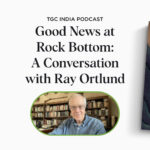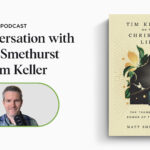Our work or vocation is very much a part of the gospel story. In this series, The Gospel Coalition India invites working professionals and entrepreneurs to reflect on their work through the five chapters of the gospel narrative—creation, fall, redemption, renewal and new creation.
Vocation: Tell us about your work
I am a medical doctor by profession. I have worked in the medical field for over 5 years. I have spent the last two years working at a mission hospital in North India. It is a secondary-level healthcare centre.
Creation: How does your work connect with God’s original creation plan for humanity?
I feel this is the easiest question to answer for medical doctors. I keep thinking that medical doctors are going to be jobless in heaven, as we won’t have anything to do.
As I read the Genesis account of creation, I see that God created the earth and it was good. There was harmony between God and man, between God and creation. My job deals with the tangible physical effects of the fall when it comes to the body. Death is the epitome of brokenness. Man’s soul and body are separated. Any illness or sickness brings disharmony within the being of man. This was not there originally. This is how my work connects with creation. In some way, we are trying to redeem that aspect of creation. Though death is unavoidable eventually, as doctors, we are trying to treat people so they can prolong their life.
Fall: How is your work making you aware of your own brokenness and the brokenness of the world around you?
People going into missions or any profession go with a sense of I am going to make a change. We have ideals and a vision of the transformation we want to bring. But often, we overestimate the kind of transformation we can bring and we live in denial of our own motives. As broken people, we have motives that are not godly. Medical doctors deal with a lot of pride because we save lives and we wear that as a badge on our shoulders. There is a sense of pride because we are making the world a better place.
When I went to work, especially in missions, I expected to work with like-minded people and believers. I had a utopian vision, but then I saw people are broken everywhere. And when broken people are together, there is conflict. There is disagreement and politics. So when this is thrown at you, you realize how broken you are. It is a mirror which helps me see that I am broken too. It helps me see how much I am messed up and how much grace I need in my life.
I can be most impatient with my believing friends and colleagues because there is a subconscious expectation of how they should behave. When I feel bitterness, anger, and frustration about this, I am also able to see that it was not only them at fault, but me too. I am able to see the brokenness of the world, as well as in me.
At work, I had to once handle a case of a young woman and her husband who wanted an abortion. When we spoke to the wife one-on-one we understood that she had an affair and the child she was carrying was not her husband’s. At that moment, I saw the anguish in the husband who did not want to bring this child into the world. But I was also able to see that the wife didn’t want to terminate the pregnancy. Watching them as a couple was perplexing for me. This is an example of brokenness in the world. I wish this was not there. Something which should not be happening was happening, and it was heartbreaking.
Redemption: Could you share a recent example of how the gospel made you a better worker?
There isn’t one particular example. The medical field is high-stress because you have to make immediate decisions which would affect the life of a person. Sometimes when you are working in that environment it is easy to lash out at team members and project your anxiety on them and blame them. At these times, the gospel reminds me of what God has done for me. The gospel helps me find peace in high-stress situations. I know there is nothing I can do to make God love me more or love me less.
In the medical field, there is also a lot of guilt. When we lose a patient there is a lot of blame from relatives and team members. So instead of wallowing in guilt, it is a good reminder that the merit of what comes about doesn’t lie in your hand.
Renewal: How are you able to love and serve others in and through your work?
I used to watch this TV series called House M.D. where the protagonist, a doctor often said, “everybody lies”. But I have tweaked it to say “everybody dies”.
Imagine someone has a life-threatening condition. I treat them and they go on to live a good life. Even then, no matter how much I’ve done, this person will die, if not now, later. So when I deal with my patients I try and see how can I serve them with eternity in perspective. Not every conversation I have with a patient is about God. I look for an opportunity to introduce the hope of eternity through Christ. It doesn’t happen always, but when it does, it gives me a chance to point them to Jesus. I take far more happiness in that than in anything else I’ve done.
Another way I try and serve others is through discipleship. Young, Christian doctors’ are dealing with challenging ethical issues. They’re floundering and there is a generation that has gone by without discussing the reality of being a believing Christian in the medical profession. So I try and talk to doctors younger than me and try to help them see that this is a profession given to us by God. Oftentimes, this means helping them with a procedure or with tasks in the hospital. Sometimes it opens up opportunities to talk about faith, about things they’re struggling with. These conversations help me point them to see their circumstances through the lens of the gospel.
New Creation: How do you connect your work here and now to our longing for the perfect world that Christ will bring when He comes again?
There are many aspects to health – physical, mental, and emotional. So when you see stories like the couple who wanted an abortion play out, I end up longing for the new heavens and earth. Sometimes life can get weary when you’re dealing with tangible brokenness in front of you. I see my work as trying to restore and heal creation to a glimpse of what it was before the fall. At the same time, I consider the spiritual aspect of being able to talk to people about God. The only way I can talk about Christ is through hope – their situation may or may not change. But their hope doesn’t rely on that situation but on Christ. And on that day when he returns, the ultimate physician will heal, restore, and, will set everything right.












